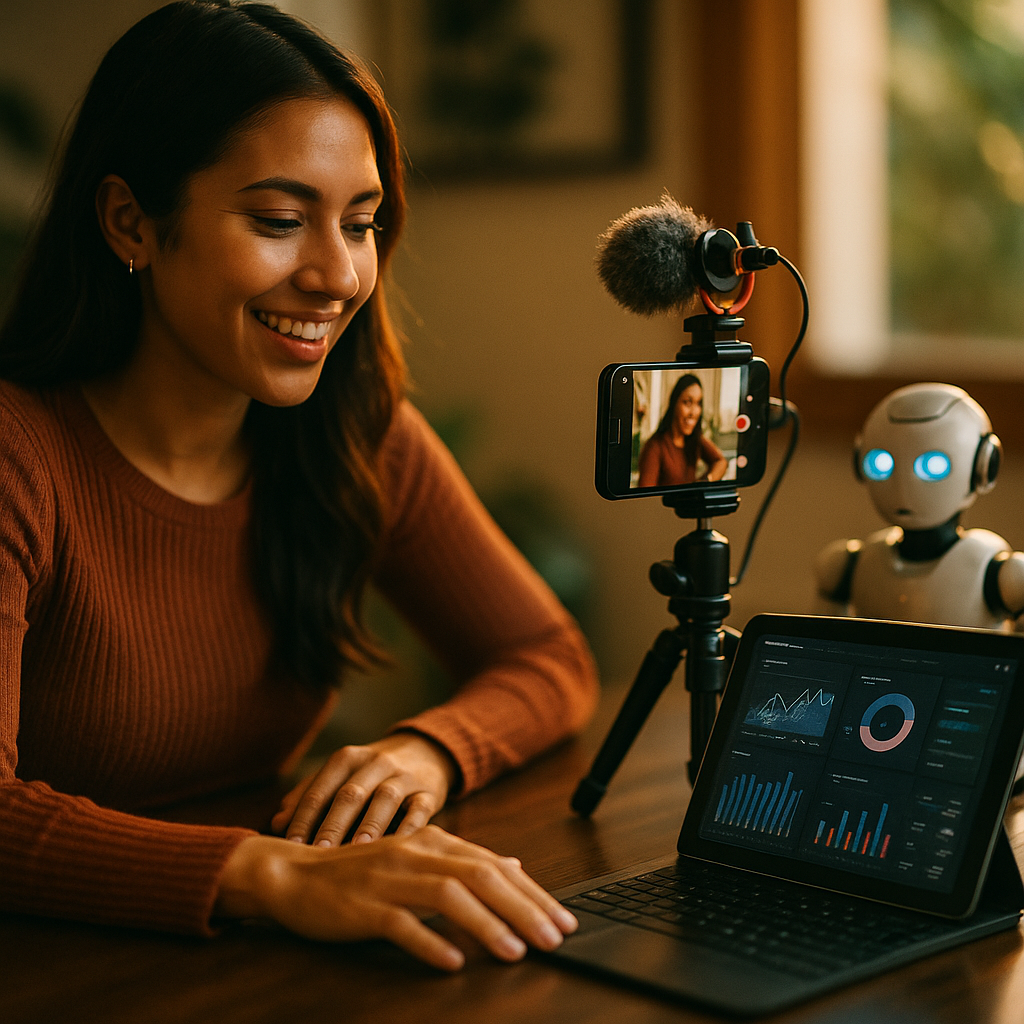Using AI to analyze and predict the effectiveness of influencer marketing campaigns is revolutionizing how brands measure ROI and optimize their strategies. With influencer marketing budgets steadily rising in 2025, understanding campaign impact has never been more critical. Discover how artificial intelligence is transforming influencer marketing, helping brands achieve higher engagement and superior results.
How AI Transforms Influencer Analytics
Artificial intelligence is fundamentally changing how marketers evaluate influencer performance. By processing vast amounts of data from social media platforms, AI identifies complex patterns, correlations, and engagement trends that manual analysis may miss. Unlike traditional analytics that rely on surface measures such as likes and comments, AI dives deeper into sentiment analysis, content reach, audience authenticity, and conversion paths.
Key benefits of AI-driven analytics include:
- Automated, real-time tracking of influencer campaigns across multiple channels
- Identification of fraudulent activity and fake followers
- Uncovering nuanced sentiment and audience motivations
- Predictive insights for campaign optimization
Modern AI systems integrate with platforms like Instagram, TikTok, and YouTube, enabling marketers to evaluate thousands of posts in seconds. This allows for rapid adaptation and targeted content improvements within active campaigns.
Predictive Modeling to Enhance Campaign Outcome
Predictive analytics utilizes machine learning to forecast campaign results before they’re fully executed. By training on historic data—such as previous campaign performance, demographic details, time of posting, and influencer niche—AI models project engagement rates, conversion probabilities, and estimated return on investment (ROI).
Advantages of predictive modeling in influencer marketing:
- Minimizes investment risk by identifying high-probability success factors
- Optimizes influencer selection using automated scoring models
- Helps craft more compelling, data-driven campaign briefs
- Enables A/B testing with dynamic feedback loops
As brands demand measurable impact—and as regulations tighten around influencer disclosures—AI-powered predictions allow teams to back intuition with empirical data, boosting strategic confidence.
Improving Influencer Selection with AI-Powered Tools
Choosing the right influencer is central to campaign effectiveness. In 2025, AI-powered influencer discovery tools offer much more than follower count analysis. They screen for audience relevance, engagement integrity, content alignment, and past partnership outcomes.
AI-driven selection platforms analyze:
- Voice, style, and sentiment in influencer content
- Audience demographics and psychographics
- Follower authenticity and engagement patterns
- Content performance benchmarks compared to industry standards
Recent studies show that campaigns leveraging AI for influencer matching achieve up to 40% greater engagement than manual selections. By aligning brand values with authentic voices, AI reduces mismatches and maximizes return.
Maximizing ROI Through Real-Time Campaign Optimization
Traditional influencer analytics often report results weeks after a campaign ends, limiting timely improvements. In contrast, AI-enabled platforms track campaign performance minute-by-minute, flagging underperforming content and suggesting optimizations in real time. This means budget allocation, creative adjustments, and scheduling changes can all be made while the campaign is still live.
Live AI optimization features include:
- Automated detection of content saturation or audience fatigue
- Dynamic adjustment of posting schedules for ideal engagement windows
- Personalized content recommendations based on real-time engagement
- Predictive allocation of resources to outperforming influencers or content types
This agile approach ensures brands don’t just measure ROI—they actively enhance it, securing more value for every marketing dollar spent.
Ensuring Transparency and Trust with AI Analysis
Transparency and credibility are top priorities for sustainable influencer marketing. AI-driven verification tools detect fake followers, identify engagement pods, and flag non-compliance with industry guidelines or ad disclosures. This protects both brand reputation and consumer trust.
Key transparency features offered by AI analysis:
- Audit trails of influencer activity and campaign communications
- Reporting on non-organic engagement and anomalies
- Automated compliance checks for FTC and local regulations
- Dashboard visualizations for stakeholder transparency
As regulatory frameworks evolve in 2025 and beyond, AI ensures that campaigns meet the highest standards of ethical marketing—all while helping brands demonstrate their commitment to authenticity and consumer safety.
Emerging Trends: The Future of AI and Influencer Marketing
The integration of AI and influencer marketing continues to evolve rapidly. Emerging trends include the use of generative AI for content creation, AI-powered virtual influencers, and hyper-personalized campaigns based on consumer data modeling. Additionally, brands increasingly leverage AI to analyze short-form video performance and correlate it to in-store or e-commerce sales data.
In the next phase, end-to-end campaign management solutions will use AI to automate briefing, contracting, monitoring, and reporting, making influencer marketing more accessible and accountable than ever before.
Conclusion: AI as an Essential Driver for Effective Influencer Marketing
Brands using AI to analyze and predict the effectiveness of influencer marketing campaigns gain a decisive advantage in measuring, optimizing, and scaling results. With machine intelligence, marketers can ensure smarter investments and higher trust in influencer partnerships—making AI an essential component of every high-performing marketing team in 2025.
FAQs: Using AI for Influencer Marketing Effectiveness
- How does AI measure influencer campaign effectiveness?
AI measures campaign effectiveness by analyzing engagement rates, sentiment, audience growth, click-throughs, conversions, and even the authenticity of interactions—offering a multidimensional view of campaign impact. - Can AI really prevent influencer fraud?
Yes, AI detects fake followers, engagement pods, and suspicious activity patterns, reducing the risk of fraudulent influencer partnerships. - Are AI tools suitable for small businesses or only large brands?
Many AI-driven influencer marketing tools are scalable and accessible to small businesses, offering affordable pricing and user-friendly interfaces. - How are brands using AI-generated data for ongoing improvements?
Brands use AI-generated insights to refine influencer selection, adjust campaign timing, personalize content, and allocate budget dynamically for continuous improvement. - Is AI replacing human marketers in influencer campaigns?
AI acts as a collaborative tool, enhancing human decision-making with data-driven insights but not replacing creative or strategic marketers.
